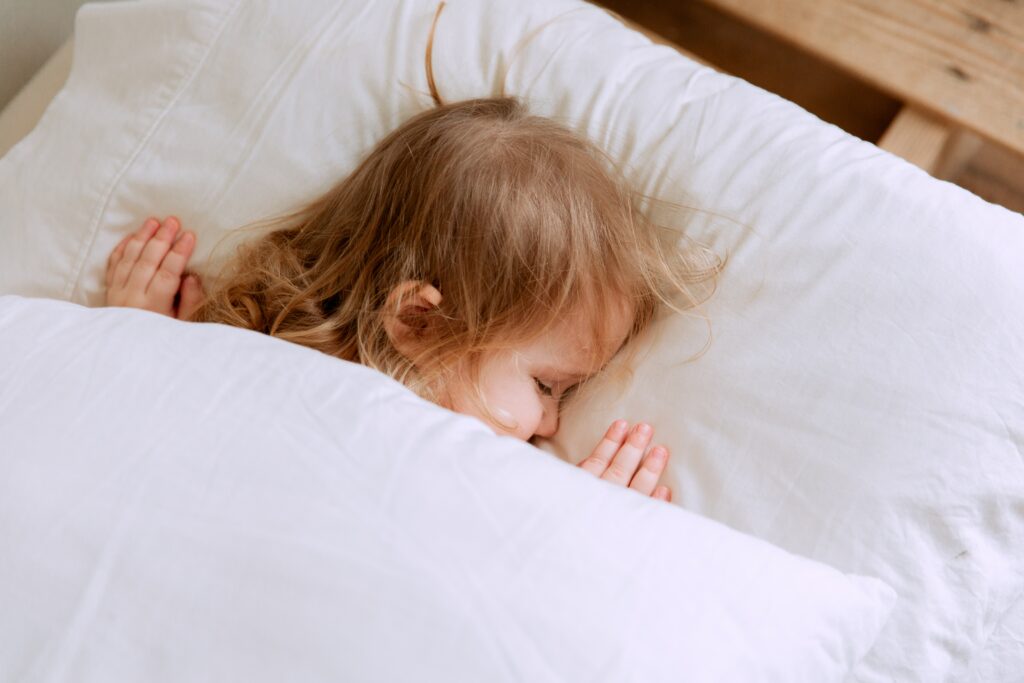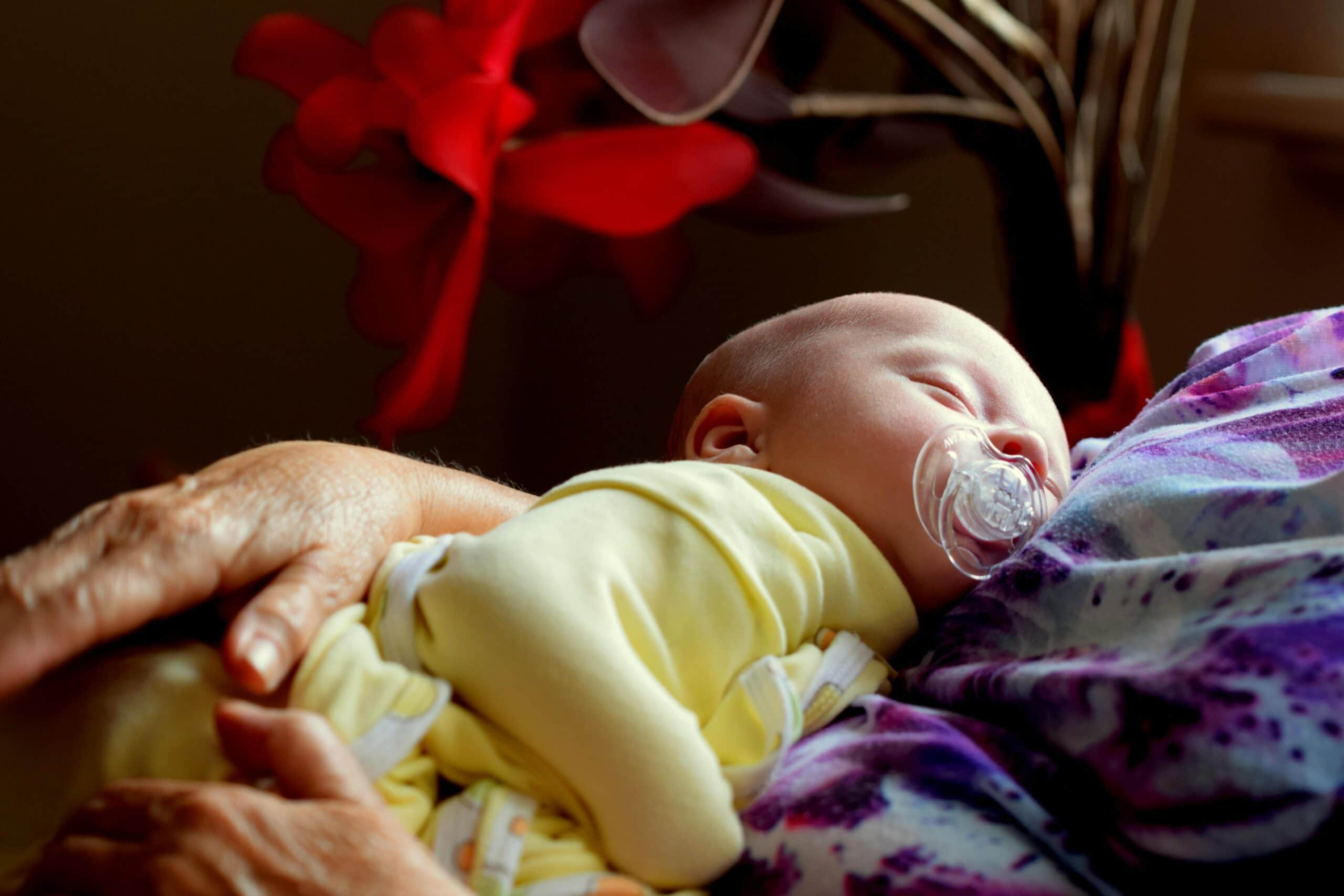Parenting can be one of the most rewarding and challenging experiences in life. One aspect of parenting that can be particularly challenging is helping your baby sleep well. Generally, a baby fall asleep in three steps feeding, rock and singing.
Feeding is to fill the baby stomach so that the baby will not be hungry or upset when lying down. Rock is to calm the baby mood through gentle movements, such as gently rocking your child in your arms before putting them down. Singing is to help babies fall asleep through the sound of your voice.
In order to help the baby sleep well, you need to follow a bedtime routine from beginning to end. Sometimes sleep training can also strengthen your baby’s sleeping schedule. A great good night’s sleep can help your baby’s health and happiness while you are part of that essential team keeping your infant healthy, happy and safe.
If the nighttime is associated with darkness or fear for your child, it can be challenging to get children to settle down. Often, parents use soft lighting or night lights to soothe their babies at bedtime. Though good sleep habits will help your baby sleep better and it helps to avoid many diseases like sudden infant death syndrome, colic, asthma and heart disease. If your baby has trouble falling asleep during the night, here are some simple techniques that can be used to make your baby sleep faster and better.
In This Article
- 11 Tips to make your baby sleep
- 1. Try 5 S’s
- 2. Create bedtime routine
- 3. Try the soporific effect of white noise
- 4. Let baby sleep in your bed
- 5. Use a pacifier
- 6. Massage, massage and more massage
- 7. Give enough feedings throughout the day
- 8. Establishing a regular sleep schedule
- 9. Make the crib environment comfortable
- 10. Prepare yourself for quick changes
- 11. Give baby a gentle awakening
11 Tips to make your baby sleep

Although the baby wakes up at night is completely normal and it is an indicator of their development. Getting the baby to sleep at night is an art, which requires patience and practice. A study showed that children who had no pre-sleep routines took longer to fall asleep at night. The problem is that it takes time for the baby falls asleep and sometimes sleep training takes months. But don’t worry below we have mentioned some best tips to make baby’s sleep at night and they are
1. Try 5 S’s
Swaddling Swaddling is a technique in which you wrap your baby with a thin and soft cloth. It may help them to get familiar and secure.
Shushing This is another effective method that helps the baby to fall asleep quickly. You can shush by making a hissing sound near their ear, which calms the baby.
Side or Stomach position You can place your baby either on her side or stomach to help her fall asleep quickly. This is because babies find it hard to breathe when they are lying on their back which makes them more restless, whereas sleeping with the face down calms them.
Swinging You can rock your baby gently in a rocking chair or swing, which will help her to get into sleep.
Sucking You can also put your finger in the mouth of the baby and they will start sucking it automatically, which makes them feel sleepy.
2. Create bedtime routine
Babies sleep very well in a routine and sleep-deprived parents are sensitive to this fact. It’s about creating a bedtime routine that can be the same every night. The most important thing is to establish sleep habits, so it is advisable to focus on what you want to achieve rather than how long a baby’s sleep. For example, if your goal is for your child to go to sleep quickly at night, then try to put your baby in bed drowsy but awake. If the goal is to ensure that the baby sleeps at least six hours, then you should aim to stay beside their crib until they are asleep.
3. Try the soporific effect of white noise

Many babies are afraid of silence. When they are alone in their cribs, they can hear the tick-tock of the clock or the sound of a passing car, and these noises can make them feel insecure. That is why you should try to use white noise to facilitate sleep. It will help your baby drown out background sounds and relax. National sleep foundation (NSF) recommends the use of white noise to help babies sleep better.
4. Let baby sleep in your bed
Baby sleeping on their own is hard to achieve. Your baby sleeps better on your bed, and will likely resist sleeping in their own crib or bassinet. So do not insist if you want your baby to sleep with you at night. Firstly firm sleep surface is necessary for the baby, so a portable crib or play yard in your bedroom is a better idea. Secondly, if you do not want to sleep with the baby in your bed, then you should think about using a bassinet or another safe place where he can sleep close to you.
5. Use a pacifier
For your baby consistent sleep, your doctor may recommend the use of a pacifier. Not only is it unlikely that pacifiers cause any damage, but they can also be beneficial because they satisfy the baby’s desire to suck, which decreases over time. Sleep training to feed baby is one of the most effective ways to get your baby’s sleep. Generally, a baby cry less when they are sucking. The baby sucks their thumb or fingers but that is not the same as having a pacifier in their mouth. With the help of pacifiers, a baby learn to comfort themselves by sucking on the pacifier to get back to sleep.
6. Massage, massage and more massage
Tired parents are not always patient, so it is very difficult to gather the courage to massage your baby. But this can be a great way to help them sleep better at night because baby massages have many benefits for the mental and physical development of children. Baby massages also promote parent-child bonding time, which is important in order to create a happy home. Babies love to be massaged and it soothes them before they sleep at night and it makes them stay asleep properly.
7. Give enough feedings throughout the day

Many parents should avoid late-night feeding as it can lead to the baby waking up at night. In addition, they should be given enough breastfeeds or bottles throughout the day as this also helps reduce night feeding and allows a baby to sleep longer. According to a baby’s doctor and sleep consultant, the baby fell asleep after a night at least 12-14 hours of sleep every day. It is also recommended that babies should be fed within 1-2 hours after they awaken and again before they go to bed.
8. Establishing a regular sleep schedule
This type of sleep training is more suitable for older children and babies that can sleep on their own. Babies like to adhere to a daily schedule, especially when it comes to sleeping and eating. Try to change your baby’s schedule as little as possible; otherwise, they will not be able to adjust well at night. The best way is if the whole family has the same type of schedule, so your baby can also go to bed later. If you are using an alarm clock or other device that makes a lot of noise at the same time every day, it’s best not to alarm too early in the morning.
9. Make the crib environment comfortable
Most babies like their cribs to be warm and dark. Installing a darkening shade or curtain can help to keep out the light while creating a snug environment for your baby. Good sleep training should replicate the same sleep conditions that babies are used to in utero, which includes darkness (or low light), warmth (about room temperature), and silence (including no talking). So it would be better if you can make the crib environment like this for your baby.
10. Prepare yourself for quick changes
For some babies, it may take only a few nights to get them sleeping soundly at night. However, for other children, there is no quick fix and despite the sleep, training efforts will continue throughout the week. If your baby does not fall asleep quickly or easily, do not force her to stay in bed longer than normal time because this will likely only leave them too tired to sleep well at night. It is recommended that you do not let your baby fall asleep during the day because this will only cause your baby to be too awake and active during the night.
11. Give baby a gentle awakening

The best way to do this is by gently removing the pacifier, but not fully waking your baby. Then you can place your hand on their back so they know you are near them and reassure them that you will be nearby all night long. This type of sleep coaching is done only once or twice a night for about five minutes. You must make sure that your baby really knows that you are there and will not leave them alone. With this method, parents avoid completely disrupting their babies before they go to sleep at night.
The Bottom line
Therefore, with a few simple changes, you can help your baby sleep better and longer. Start by creating a bedtime routine that includes soothing activities like singing lullabies or reading books with them before putting them down for the night. It’s also important to make sure they have enough space in their crib and aren’t too hot (or cold). The more consistent the environment is during a child’s nap time, day or night, the better they’ll be able to regulate their own sleep patterns.
Babies are most vulnerable when they’re awake at night due to this lack of consistency in their sleeping habits. This means that if you want them to have an easier nighttime experience without worrying about what might happen next, make sure they follow a regular evening pattern which includes naps before bed so that there isn’t any confusion over how long it takes for them to fall asleep on their own once lights outcome around. A pacifier may be helpful as well. We hope these tips could work for you, please contact us if you have any queries regarding the above context.










![Home Renovation Guide [2025]](/app/uploads/2021/04/design-hacks-1-378x300.jpg)
